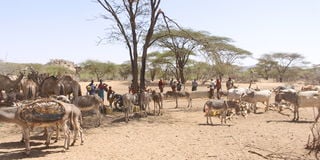Livestock farmers urged to adopt sustainable production

Livestock at Nairabala watering point in Laisamis, Marsabit County. While cattle have been among the most important farm animals in parts of Northern Kenya, climate change is threatening their existence.
Marsabit livestock farmers have been urged to adopt sustainable production to help mitigate the devastating economic impact of drought in Northern Kenya.
The county deputy livestock director Stephen Riungu said with drought-induced food insecurity in arid areas, there was a need to change the approach to livestock keeping in pastoralist communities.
“The Marsabit County government is committed to supporting a campaign to ensure herders are equipped with the necessary information for better livestock management and husbandry,” Mr Riungu said.
He spoke during the launch of a social behaviour change campaign called ‘Ufugaji Bora, Maisha Bora’ in Laisamis. Feed the Future Livestock Market System (LMS) activated the initiative to address the challenges faced by pastoralists and help them improve their livelihoods.
At least 73 medium and small-scale entrepreneurs have benefitted from more than Sh200 million in grants aimed at bolstering the incomes and livelihood diversification of herders in Garissa, Isiolo, Marsabit and Turkana counties.
The project is funded by USAID and herders were trained on modern pastoralism, immunisation, vaccination and high-quality feeds and minerals salts.
Mr Riungu called on herders to embrace value-chain processes by selling their livestock through cooperatives and producer groups to enhance their incomes.
He expressed concerns that due to climate change impacts, pastoralists in Marsabit County had lost huge numbers of livestock to drought, flash floods and diseases.
He blamed the livestock deaths during drought on poor animal husbandry and called on pastoralists to adopt climate-smart practices, including destocking and rearing only healthy livestock to avert losses.
Marsabit Livestock Market Systems enterprise development coordinator Guyo Yattani explained that their campaigns were tailored to address socioeconomic and environmental aspects for behaviour change among herders.
“We want to empower pastoralist communities through partnership with the county government to ensure they are prepared to manage the effects of drought by training them,” Mr Yattani said.
Some herders observed that pastoralist communities were incurring huge losses due to their conservative nature of sticking to traditional animal husbandry methods.
Mr Peter Gargesi explained how herders had to sell their animals at throwaway prices when the 2021-2022 drought hit the region.
In 2015, a livestock census indicated that Marsabit County had 424,603 cattle, 1,143,480 goats, 960,004 sheep, 203,320 camels, 63,861 donkeys and 50,690 chickens.
The 2021-2022 drought saw more than 224,000 animals, including cattle, sheep and goats, succumb, according to a March 2022 KALRO survey.





